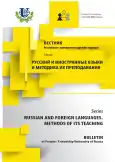№ 4 (2008)
- Год: 2008
- Статей: 12
- URL: https://journal-vniispk.ru/2618-8163/issue/view/23455
Статьи
 5-9
5-9


Успешная интернет-коммуникация как модель самоидентификации и самопрезентации личности в постсоветском социуме (дискурсивно-методологический опыт)
Аннотация
В статье рассматривается дискурсивная практика Интернета как возможный опыт разрешения проблем кризисной коммуникации, формирования Я-концепции личности; разрабатываются методологические принципы использования интернет-дискурса в моделировании личностью собственных жизненных стратегий, создании нового имиджа.
Русистика. 2008;(4):10-17
 10-17
10-17


Семантические преобразования фразеологических единиц со значением места в интернет-дневниках
Аннотация
В статье рассматриваются полисемия и вариантность фразеологизмов как результат их трансформации в интернет-дневниках, фиксирующих тенденции развития языка в речи интернет-пользователей, объясняются причины этих языковых явлений с позиций лингвокультурологии.
Русистика. 2008;(4):18-26
 18-26
18-26


От ритуала и мифа к метафоре
Аннотация
Статья посвящена проблемам изучения метафоры. Метафора воспринимается как форма продолжения жизни ритуала и мифа, которые являются способом осмысления мира человеком традиционной культуры, находящимся во власти мифологического мышления. Метафора базируется на мифологических представлениях человека и транслирует из поколения в поколение традиционные архетипы.
Русистика. 2008;(4):27-36
 27-36
27-36


 37-43
37-43


Русский язык в условиях образовательной системы Сенегала
Аннотация
Проблемы изучения русского языка в Сенегале рассмотрены в историческом и современном аспектах. С начала преподавания русского языка в Сенегале возникали проблемы как материальные, так и дидактические и педагогические. Но благодаря упорной работе опытных преподавателей-русистов нашей страны, русский язык получает все большее распространение.
Русистика. 2008;(4):44-48
 44-48
44-48


Дихотомия ЗДОРОВЬЕ-БОЛЕЗНЬ в концептосфере политика (на материале интервью)
Аннотация
В статье анализируется концептуальная модель «ЗДОРОВЬЕ - БОЛЕЗНЬ», которая актуализирует пласт образной лексики, обозначающей физическое или нравственное состояние общества, и представляет собой один из способов осмысления действительности в картине мира современного политического деятеля.
Русистика. 2008;(4):49-54
 49-54
49-54


Функционально-стилистическая и структурно-графическая интерпретация арабских газетных заголовков
Аннотация
Арабские газетные (журнальные) заголовки имеют ряд лингвостилистических особенностей, которые способствуют эффективному воздействию на восприятие читателя: употребление фразеологических оборотов, использование глаголов преимущественно в настоящем-будущем времени, оформление субъекта действия в начале предложения, своеобразное графическое расположение подзаголовков и др.
Русистика. 2008;(4):55-63
 55-63
55-63


Корректировочный курс по практикуму устной и письменной речи для иностранных студентов с учетом инновационных методик в системе бакалавриата
Аннотация
Представлен инновационный корректировочный курс по практикуму устной и письменной речи для иностранных студентов I курса гуманитарных специальностей бакалавриата, даны основные методические рекомендации для преподавателей по работе с учебно-методическим комплексом.
Русистика. 2008;(4):64-69
 64-69
64-69


Современный научный текст в преподавании РКИ студентам-лингвистам как новая форма обучения
Аннотация
Статья представляет собой анализ авторского учебника «Современный научный текст в преподавании РКИ студентам-лингвистам». В статье рассматриваются вопросы преподавания научного стиля речи в иностранной аудитории. Указывается на необходимость создания учебника нового типа.
Русистика. 2008;(4):70-73
 70-73
70-73


Рецензия на монографию В.И. Шляхова «Сценарии русского речевого взаимодействия». - М., 2007. - 276 с.
Русистика. 2008;(4):74-76
 74-76
74-76


Рецензия на монографию И.П. Зайцева «Поэтика современного драматургического дискурса». - М.: Прометей, 2002. - 252 с.
Русистика. 2008;(4):77-78
 77-78
77-78











